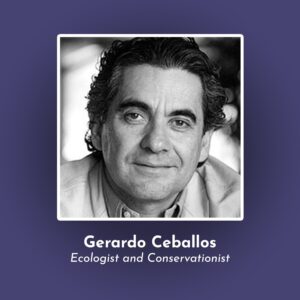
Ep 25 | Gerardo Ceballos
Gerardo Ceballos: “Will the Ongoing Population Extinctions Lead to a 6th Mass Extinction?”
On this episode, we meet with ecologist and conservationist Dr. Gerardo Ceballos.
Ceballos discusses animal populations, the sixth mass extinction, his new project, Creatures United, and how we can better care about and protect Earth’s remaining biodiversity.
About Gerardo Ceballos
Dr. Gerardo Ceballos is an ecologist and conservationist very well-known for his theoretical and empirical work on animal ecology and conservation. He is particularly recognized by his influential work on global patterns of distribution of diversity, endemism, and extinction risk in vertebrates. Ceballos was the first scientist to publish the distribution of a complete group of organisms (mammals). He is also well – known for his contribution to understanding the magnitude and impacts of the sixth mass extinction; he has shown that vertebrate species that became extinct in the last century would have taken more than 10 thousand years under the “normal” extinction rate.
In French, we have a motto that says that a simple drawing is often better than a long explanation. Jean-Marc Jancovici Carbone 4 President
That’s very understandable because with left atmosphere thinking, one of the problems is that you see everything as a series of problems that must have solutions. Iain McGilchrist Neuroscientist and Philosopher
We can’t have hundreds and hundreds of real relationships that are healthy because that requires time and effort and full attention and awareness of being in real relationship and conversation with the other human. Nate Hagens Director of ISEOF
This is the crux of the whole problem. Individual parts of nature are more valuable than the biocomplexity of nature. Thomas Crowther Founder Restor
Show Notes & Links to Learn More
Download transcript00:40 – Gerardo’s works, books, info, and Stop Extinction
02:28 – The Last Eskimo [Last of the Curlews]
03:47 – How many species exist on earth
04:44 – Every year 18,000 species are described
04:45 – 2 new whale species discovered in 2021 – Rice Whale and Ramari’s beaked whale
05:02 – Since 2000 there have been over 60 new species of primates
05:10 – A new species of orangutans was found in 2017
05:40 – The steller’s sea cow was found and described after it was distinct
06:46 – Right now we have the highest number of species in the last 700 million years
07:27 – We have lost a lot of species in the last 10,000 years
08:05 – The giant mammals of North America, many of which were killed off because of humans
08:25 – Pleistocene extinction
08:48 – 18,000 years ago there was 3 km of ice in the middle of North America
09:40 – Number of vertebrate species on Earth
10:20 – It would take 2,000 years to catalog all the species on Earth
11:28 – Flying squirrels
12:33 – Cape Hunting Dog
14:04 – Mexican President’s investment in fossil fuels
16:56 – Neurochemicals and technology vs nature
18:45 – Citizen Kane
24:03 – E.O. Wilson
27:01 – Understanding the Challenges of Avoiding a Ghastly Future
27:38 – Paul Ehrlich and his TGS Episode
27:50 – Gerardo’s first paper – Diversity and Conservation of Mexican Mammals (1991)
30:54 – Ecological extinction
31:39 – Population drop of elephants since the beginning of the century
32:13 – Ecological services of elephants
33:38 – Elk and wolves ecosystem in Yellowstone
34:31 – An elephant is being killed every ~40 minutes
35:22 – TGS Episode with Peter Ward
36:22 – Ease of disease spread in wet markets
36:45 – Illegal wildlife trade is highly profitable
41:18 – David Attenborough
43:06 – Biological Annihilation
44:33 – 80% of individual animals have been lost since the 1970s
45:30 – Only 2% of the large fish remain on the planet in mid 2000s compared to the 1960s
46:09 – Decreased insects stuck to cars
47:13 – Daniel Pauly Shifting Baselines and TGS Episode
50:55 – Pesticide effects on insect populations
51:22 – Monarch Butterfly population decline
52:50 – Jaguar populations
53:45 – Gerardo’s work recovering Jaguar populations
54:57 – Issues with inbreeding among low populations
55:40 – The Elephant Seal protection
56:04 – 1920 declaration of Mexico as a marine animal haven
56:42 – 500 individuals is the critical population point
57:06 – Vertebrates on the brink as indicators of biological annihilation and the sixth mass extinction
57:57 – The mass of all humans and domestic animals is 96% of the entire planet
59:35 – 70% of bird biomass is domestic birds, and 30% is the other 11,000 species
1:01:34 – Ecuador has 2,000 species of birds while the continental U.S. has 800
1:02:14 – Industrial breeding of chickens
1:03:37 – Rate of change of climate is faster than anticipated
1:03:56 – Peak Oil Podcast
1:04:40 – Past pandemics
1:04:50 – Statistics of hunger and refugees
1:09:12 – The Maya Train
1:12:00 – 6th Mass Extinction
1:13:42 – Tony Barnosky et. al Has the Earth’s sixth mass extinction already arrived?
1:14:10 – Background extinction rate
1:15:20 – Background extinction rates for invertebrates
1:19:25 – Nuclear Winter
1:20:00 – Gerardo’s lab
1:21:54 – Proposed Endangered Species Act in Mexico
1:23:38 – Ways to reduce your environmental footprint
1:27:03 – Stop Extinction – Creatures United campaign coming soon







